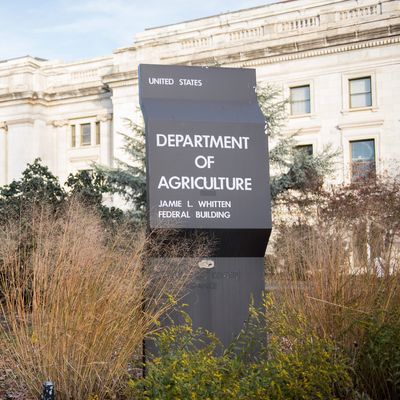
One of the Department of Agriculture’s primary functions is to help American farmers weather the many challenges inherent to their industry. The USDA tries to serve that mission by, among other things, keeping U.S. farmers well-informed about potential ecological and macroeconomic threats to their businesses.
Alas, the Trump administration hasn’t looked too kindly on that particular objective, for reasons that aren’t too hard to discern: The biggest long-term ecological threat to U.S. agriculture is the climate crisis that the president refuses to acknowledge, while the biggest near-term economic threat to Big Ag’s well-being has been Donald Trump’s trade policies.
Back in May, Politico reported that Trump’s Secretary of Agriculture Sonny Perdue had “retaliated” against the department’s economists for producing reports that highlighted the sharp decline in farm income during the president’s tenure. Specifically, Perdue brought the USDA’s Economic Research Service (ERS) under the control of its chief economist, who reports directly to him. Then, he moved the ERS from D.C. to Kansas City. Together, these moves triggered a mass exodus of economists from the office, and two-thirds of the ERS’s positions are still unfilled.
Perdue’s department allegedly took a similar approach to ecological research it did not like. As Politico reported in June:
The Trump administration has refused to publicize dozens of government-funded studies that carry warnings about the effects of climate change, defying a longstanding practice of touting such findings by the Agriculture Department’s acclaimed in-house scientists.
The studies range from a groundbreaking discovery that rice loses vitamins in a carbon-rich environment — a potentially serious health concern for the 600 million people world-wide whose diet consists mostly of rice — to a finding that climate change could exacerbate allergy seasons to a warning to farmers about the reduction in quality of grasses important for raising cattle.
… [I]n the case of the groundbreaking rice study USDA officials not only withheld their own prepared release, but actively sought to prevent dissemination of the findings by the agency’s research partners.
This week, the USDA’s inspector general Phyllis Fong announced that her office is launching a formal investigation into the department’s alleged suppression of climate science. In a letter to Democratic lawmakers who had requested such a probe, Fong also acknowledged concerns that USDA’s decision to relocate both the ERS and National Institute of Food and Agriculture to Kansas City might have been intended “as a means to suppress research on controversial topics such as climate change.”
The federal government’s 2018 National Climate Assessment report found that, on our current warming trajectory, Midwest farmers could see their productivity fall to levels not seen since the droughts of the 1980s. The USDA is currently spending less than one percent of its budget on climate mitigation and adaptation efforts.






























